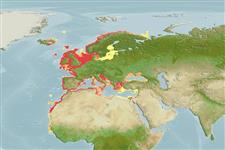Teleostei >
Eupercaria/misc (Various families in series Eupercaria)
鱸形目 (Various families in series Eupercaria) >
Moronidae (Temperate basses)
夢鱸科 (Temperate basses)
Etymology: Dicentrarchus: Greek, di = two + Greek, kentron = sting + Greek, archos = anus (Ref. 45335).
More on author: Linnaeus.
Environment: milieu / climate zone / depth range / distribution range
生態學
海洋; 淡水; 半鹹淡水 居於水底的; 海洋洄游的; 深度上下限 10 - 100 m (Ref. 9987). 亞熱帶的; 8°C - 24°C (Ref. 4944); 72°N - 11°N, 19°W - 42°E (Ref. 54221)
Eastern Atlantic: Norway to Morocco, the Canary Islands and Senegal. Also known from the Mediterranean and Black Sea. Absent from White, Barents, Baltic and Caspian Seas (Ref. 59043).
東大西洋: 挪威到摩洛哥, 加納利群島與塞內加爾。 記錄來自冰島了。 (參考文獻 12462) 也已知來自地中海與黑海。
Length at first maturity / 大小 / 重量 / 年齡
Maturity: Lm 36.1, range 23 - 46 cm
Max length : 103 cm TL 雄魚/尚未辨別雌雄; (Ref. 40637); common length : 50.0 cm TL 雄魚/尚未辨別雌雄; (Ref. 6916); 最大體重: 12.0 kg (Ref. 1468); 最大年齡: 30 年 (Ref. 59043)
背棘 (總數) : 8 - 10; 背的軟條 (總數) : 12 - 13; 臀棘: 3; 臀鰭軟條: 10 - 12. Diagnosis: head with cycloid scales above; mouth moderately protractile (Ref. 231). Vomerine teeth only anteriorly (Ref. 231), in a crescentic band (Ref. 231, 57391). Scales on interorbital space cycloid (Ref. 57391). Posterior edge of opercle finely serrated, lower edge with strong forward- directed denticles (Ref. 231). 2 flat opercular spines (Ref. 231, 57391). Young with some dark spots on upper part of body (Ref. 231).
鰓蓋的後緣細鋸齒狀的, 下緣有強的朝向前的細齒。 2根平坦的鰓蓋棘。 嘴一般可伸出。 在身體的上半部上幼魚有一些深色斑點。 頭部有圓形的鱗片上方。 犛骨齒只有前面地, 在一條新月形的條紋中。
Adults manifest demersal behavior, inhabit coastal waters down to about 100 m depth but more common in shallow waters (Ref. 54221, 57391). Found in the littoral zone on various kinds of bottoms on estuaries, lagoons and occasionally rivers. They enter coastal waters and river mouths in summer, but migrate offshore in colder weather and occur in deep water during winter in the northern range. Young fish form school, but adults appear to be less gregarious (Ref. 9987). Feed chiefly on shrimps and mollusks, also on fishes (Ref. 5990). Juveniles feed on invertebrates, taking increasingly more fish with age. Adults piscivorous . (Ref. 59043). Spawn in batches (Ref. 51846). Spawning takes place in the spring near the British Isles, and earlier in its southern range. Eggs are pelagic (Ref. 35388). Marketed fresh or smoked (Ref. 9987). Highly sought by sport fishermen (Ref. 30578).
成魚被棲息於沿岸水域的顯然的底棲行為向下至大約 100 公尺深但是較常見於淺水域.(參考文獻 54221) 他們在河口上的各種不同類型的底部上被發現於海濱的區域, 潟湖與偶然地河。 他們在夏天進入沿岸水域與河口, 但是移動較寒冷的天氣的外海而且在北方的範圍中在冬天期間出現在深水域。 幼魚形成魚群,但是成魚狀似比較不群居.(參考文獻 9987) 主要地吃吃蝦子與軟體動物,也吃魚。 (參考文獻 5990) 產卵於一批中。 (參考文獻 51846) 產卵,發生於春天在英國人的附近成為島嶼, 與比較早的在它的南方範圍中。 卵是大洋性的。 (參考文獻 35388) 在市場上銷售新鮮或燻製。 (參考文獻 9987) 深受運動釣魚者企求。 (參考文獻 30578)
Life cycle and mating behavior
成熟度 | 繁殖 | 產卵場 | 卵 | 孕卵數 | 仔魚
Spawn in groups. Eggs are pelagic. In the Mediterranean, first sexual maturity occurs generally between 2 and 4 years of age while in the Atlantic sexual maturity happens a little later (males between 4-7 years and females between 5-8 years). Spawning happens just once a year and it tends to be in winter, although in southern areas it can occur in spring. Eggs have 1-2 fat drops that fuse about 12 hours after laying. Embryo development lasts about three days at 13-14°C and larval development about 40 days at 19°C. Egg size 1.1-1.5 mm, larval length at hatching 3 mm.東大西洋: 挪威到摩洛哥, 加納利群島與塞內加爾。 記錄來自冰島了。 (參考文獻 12462) 也已知來自地中海與黑海。
Smith, C.L., 1990. Moronidae. p. 692-694. In J.C. Quero, J.C. Hureau, C. Karrer, A. Post and L. Saldanha (eds.) Check-list of the fishes of the eastern tropical Atlantic (CLOFETA). JNICT, Lisbon; SEI, Paris; and UNESCO, Paris. Vol. 2. (Ref. 6916)
IUCN 瀕危狀態 (Ref. 130435: Version 2024-2)
近危 (NT) (Near Threatened); Date assessed: 03 March 2022
人類使用
漁業: 商業性; 養殖: 商業性; 游釣魚種: 是的
工具
特別的報告
下載 XML
網路資源
Estimates based on models
Preferred temperature (Ref.
123201): 7.3 - 19.5, mean 10.7 °C (based on 788 cells).
Phylogenetic diversity index (Ref.
82804): PD
50 = 0.7656 [Uniqueness, from 0.5 = low to 2.0 = high].
Bayesian length-weight: a=0.00933 (0.00780 - 0.01117), b=3.02 (2.97 - 3.07), in cm total length, based on LWR estimates for this species (Ref.
93245).
營養階層 (Ref.
69278): 3.5 ±0.50 se; based on food items.
Generation time: 7.8 (5.0 - 11.0) years. Estimated as median ln(3)/K based on 33
growth studies.
回復力 (Ref.
120179): 中等的, 族群倍增時間最少 1.4 - 4.4年 (K=0.06-0.33; tm=2-8; tmax=30; Fec=230,000).
Prior r = 0.37, 95% CL = 0.25 - 0.56, Based on 10 full stock assessments.
Fishing Vulnerability (Ref.
59153): High to very high vulnerability (66 of 100).
Climate Vulnerability (Ref.
125649): Moderate to high vulnerability (47 of 100).
Nutrients (Ref.
124155): Calcium = 37.1 [4.5, 189.2] mg/100g; Iron = 0.869 [0.355, 2.011] mg/100g; Protein = 20.2 [19.3, 21.1] %; Omega3 = 0.3 [0.2, 0.5] g/100g; Selenium = 14.6 [7.0, 32.5] μg/100g; VitaminA = 7.01 [2.63, 20.46] μg/100g; Zinc = 0.519 [0.256, 1.128] mg/100g (wet weight); based on
nutrient studies.
